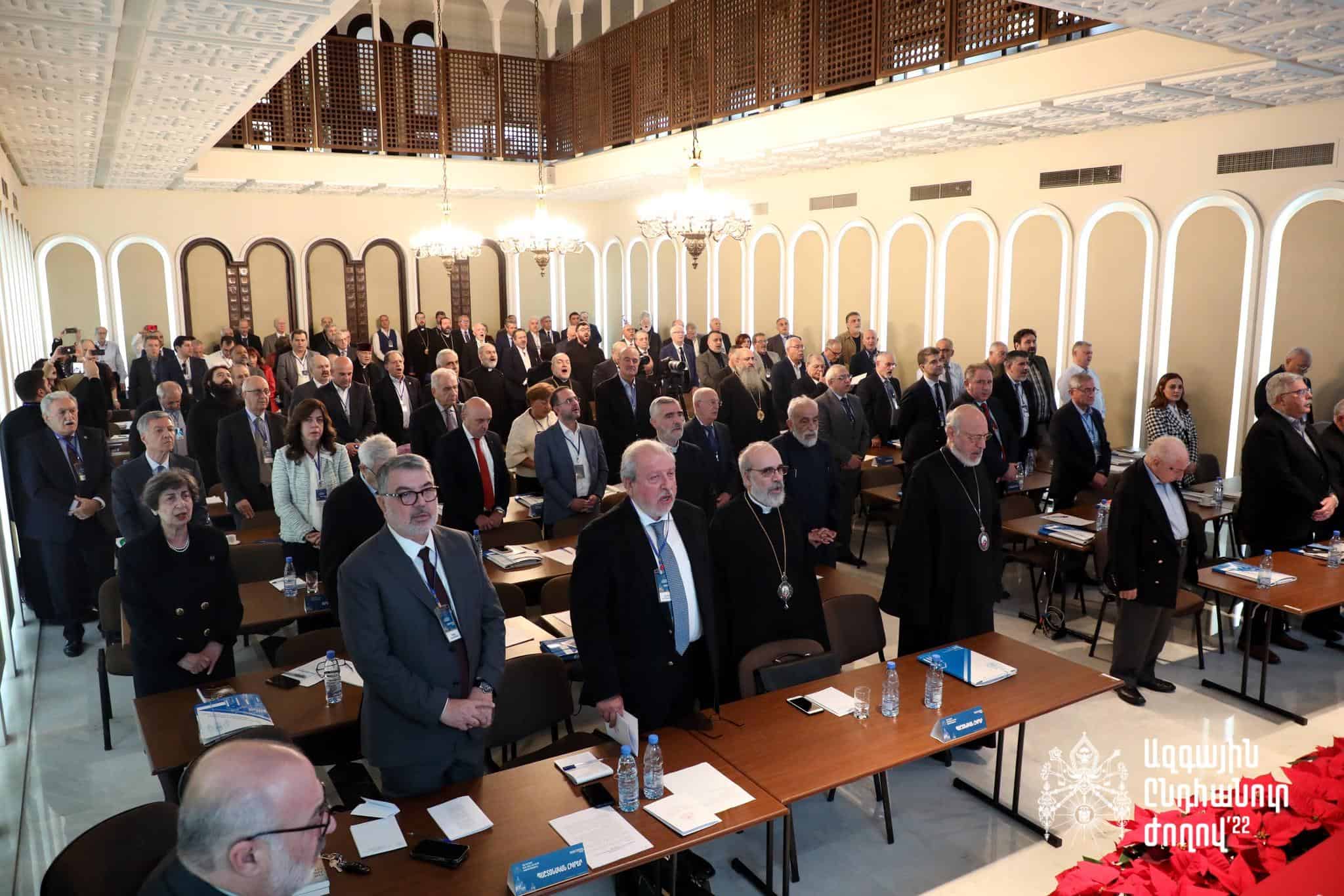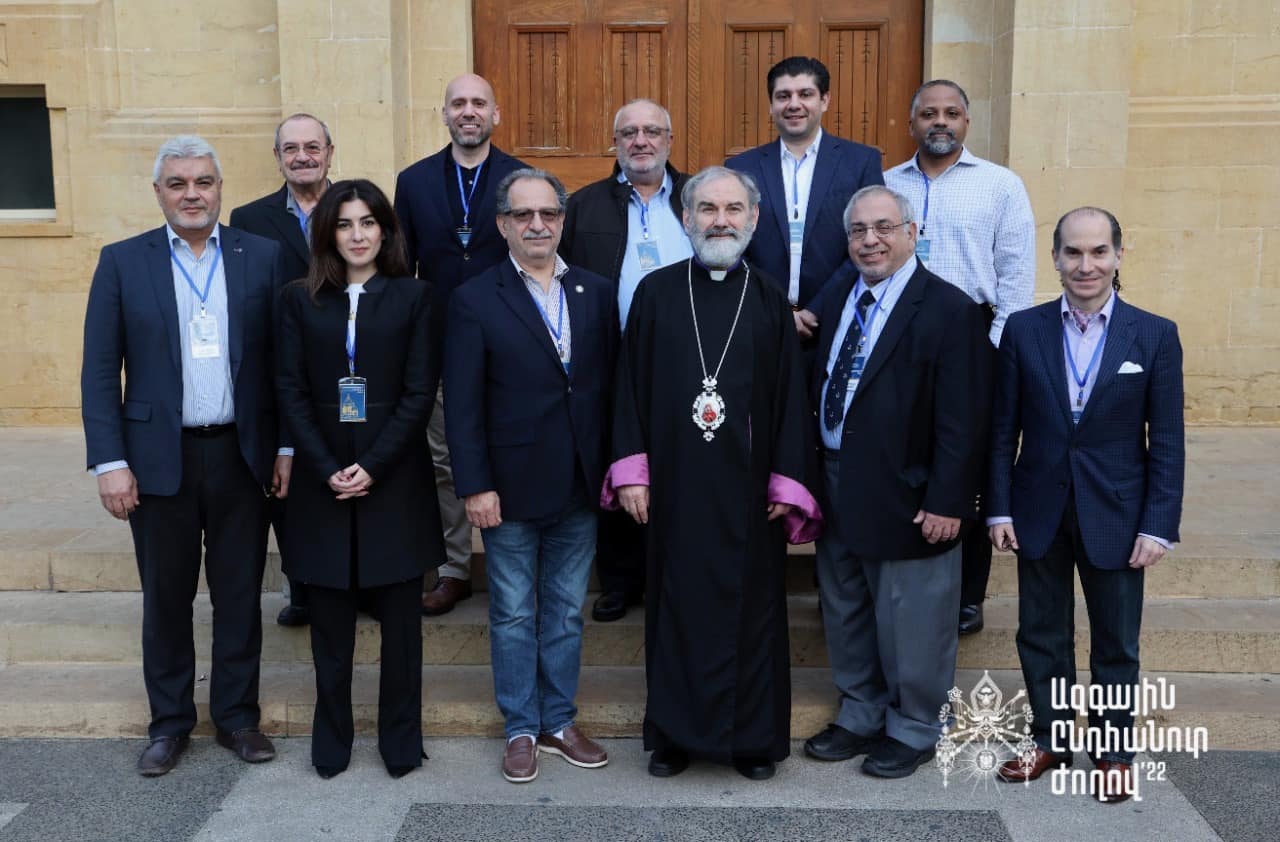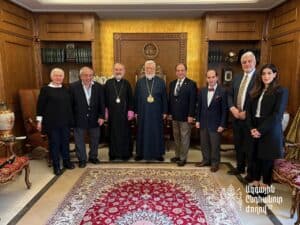
Archbishop Anoushavan and Eastern Prelacy delegates with Catholicos Aram I
His Holiness Catholicos Aram I urged Prelacies to become more actively involved in the Catholicosate’s mission as the General Assembly ended on Friday, Dec. 9, after three days of busy sessions and panels that discussed key issues for the development of the Church, Armenia, and the Diaspora.
“The Catholicosate are our Prelacies and people,” the Catholicos said. “Our work must get to the people by way of the Prelacies and it has to conform to the local conditions.”
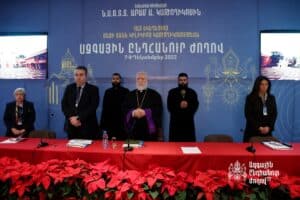
In this sense, he called for examining the manner to involve the Prelacies more actively in the collective mission. “We have to think how to achieve that,” he said.
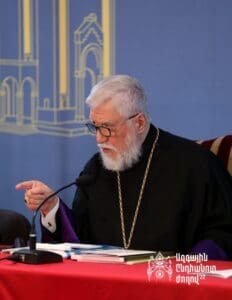
The second day of the Assembly, Dec. 8, was devoted to analyzing urgent topics concerning the transformation of the Diaspora, including family, Armenian nation-building, youth, development of Armenia and Artsakh, which were discussed by panels, followed by Q&A sessions. The proposals made during the meeting will serve as the basis for the Catholicos’ proclamation of 2023 as the Year of the Reorganization of the Diaspora as well as for the four-year planning by the newly elected Central Executive Council.
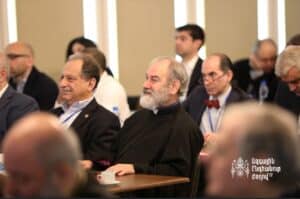
The topics discussed by the panels on Thursday included “The Armenian Family, the Key to Armenian Existence,” by Armine Sayitkhanian, from the Tehran Prelacy, and Berge Apkarian, from the Western US Prelacy; “Armenian-Making, the Guarantee of Armenian Identity,” by Hampig Karayan, from the Canadian Prelacy, and Viken Avakian, from the Lebanon Prelacy; “Youth: the Blood of Armenian Life,” by Galy Avakian, of the Armenian Church University Students’ Association, and Jacques Ketchejian, of the Zavarian Student Association, and “The Diaspora, Participant in the Strengthening of Armenia and Artsakh,” by Hagop Pakradouni, from the Lebanese Parliament and delegate of the Lebanon Prelacy) and Noel Minasian, from the Tehran Prelacy. On Friday, Seta Khedeshian and Shahan Kandaharian, both from the Lebanon Prelacy, spoke about “The Need to Reorganize the Diaspora.”
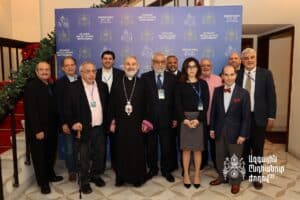
Archbishop Anoushavan and Eastern Prelacy delegates with Hagop Pakradouni, Lebanese Parliament MP
In closing remarks, His Holiness said that we may have differences, but he added that it would be unforgivable to succumb to internal discord and polarization in the face of national concerns and perils in Armenia, Artsakh, and the Diaspora. Any meeting, he said, acquires its true outlook when the ideas and decisions voiced during it materialize into actions.
The following is the list of the newly elected members of the Religious and Lay councils of the Central Executive Council.
RELIGIOUS COUNCIL
- Archbishop Gomidas Ohanian
- Archbishop Oshagan Choloyan
- Archbishop Sebouh Sarkissian
- Archbishop Kegham Khacherian
- Archbishop Nareg Alyemezian
- Archbishop Khoren Doghramajian
- Archbishop Shahan Sarkissian
- Archbishop Anoushavan Tanielian
- Archbishop Papken Tcharian
- Archbishop Shahe Panossian
- Archbishop Krikor Chiftjian
- Bishop Magar Ashkarian
- Bishop Mesrob Sarkissian
- Bishop Torkom Donoyan
- Very Rev. Fr. Stepanos Pashayan
- Rev. Fr. Baruyr Shernezian
- Rev. Fr. Hovagim Panjarjian
LAY COUNCIL
- Stepan Der Bedrossian (Lebanon)
- Mgrdich Mgrdichian (Lebanon)
- Nora Bayrakdarian (Lebanon)
- Shahan Kandaharian (Lebanon)
- Hagop Havatian (Lebanon)
- Dikran Jinbashian (Lebanon)
- Alek Mouradian (Lebanon)
- Arthur Nazarian (Lebanon)
- Seta Khedeshian (Lebanon)
- Krikor Mahseredjian (UAE)
- Rostom Aintablian (Western Prelacy)
- Hovsep Avedian (Iran)
- Gaydzag Zeitlian (Western Prelacy)
- Drtad Mangigian (Eastern Prelacy)
- Hratch Hagopian (Syria)
- Jirayr Basmadjian (Canada)
- Armen Derian (Greece)
- Archbishop Anoushavan and Eastern Prelacy delegates in the assembly hall
- Archbishop Anoushavan and Eastern Prelacy delegates in front of the St. Gregory the Illuminator Cathedral



